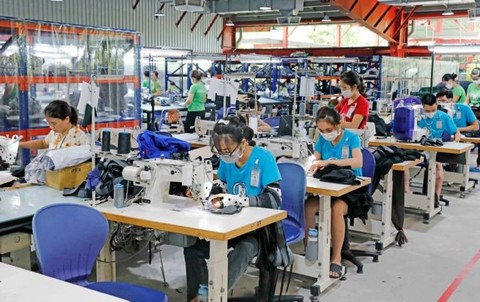
The GSO said the IIP in the first seven months of this year soared 8.5 per cent year-on-year. The index saw a yearly decline of one per cent in last year's corresponding period. — VNA/VNS Photo
The country's index of industrial production (IIP) is continuing its positive growth pace in July with an increase of 0.7 per cent over June and 11.2 per cent compared to the same period last year, according to the General Statistics Office (GSO).
The GSO said the IIP in the first seven months of this year soared 8.5 per cent year-on-year. The index saw a yearly decline of one per cent in last year's corresponding period.
The manufacturing and processing sector increased by 9.5 per cent. Electricity production and distribution was up by 12.4 per cent and water supply, waste and wastewater management and treatment activities up by 7.2 per cent. The mining sector dropped by 6.2 per cent.
Sectors that recorded a significant IIP rise were rubber and plastic, up 29 per cent, furniture (21.5 per cent), chemical and chemical products (17 per cent), metal production (13 per cent) and electronic products, computers and optical products (11.1 per cent).
Those which posted a decline in IIP were crude oil and natural gas exploitation, down 12.4 per cent; repair, maintenance and installation of machinery and equipment (3 per cent); and coal mining (1.3 per cent).
Some industrial products showed a rise in IIP from January to July, including steel bars and angle steel (31 per cent), rolled steel (17.8 per cent), NPK fertiliser (14 per cent), powdered milk (12.3 per cent) and phone components (12 per cent).
By contrast, the IIP of several goods decreased compared to the same period last year such as natural gas and liquefied petroleum gas (16.9 per cent), crude oil (7.1 per cent), beer (3.8 per cent) and mobile phones (3 per cent).
According to the GSO, the IIP surged in 66 localities such as Lai Châu (43 per cent), Phú Thọ (39 per cent), Bắc Giang (28 per cent), Bình Phước (17 per cent) and Thanh Hóa (15 per cent).
Meanwhile, the index dropped in three localities including Quảng Ngãi (4.3 per cent), Hà Tĩnh (2.1 per cent) and Gia Lai (2 per cent) during the reviewed period.
The GSO also said that the number of workers in industrial enterprises as of July 1, 2024, increased one per cent month-on-month and 3.3 per cent year-on-year.
During a conference in Hà Nội on Monday, Phạm Tuấn Anh, deputy director of the Department of Industry under the Ministry of Industry and Trade (MoIT) said the department has focused on assisting enterprises that operate in processing and manufacturing and supporting industries with applying and transferring technology and fostering work force training.
Anh said the department has also helped these firms connect with multinational assembly corporations and large suppliers in the world to find product outlets to participate in the supply chain of FDI enterprises.
Despite these positive figures seen in the first seven months, Việt Nam's industry still faces many challenges in the short and long term, according to the MoIT's Department of Industry.
The internal strength of domestic manufacturing industries is still weak and major industrial bottlenecks in the past years have not been effectively overcome. Industrial production still depends largely on external factors, especially on the FDI sector.
The added value of domestic industries is still low, while supporting industries are underdeveloped, leading to the lack of many domestic hi-tech industrial products.
On the other hand, industrial production has not recovered comprehensively. Some key manufacturing industries, such as smartphones, televisions, cars and crude iron and steel, have declined compared to the same period in 2023.
Meanwhile, some key export products, like footwear, wood, phones and components, recovered but have not yet returned to their peak of 2022.
The situation in the world and region will continue to be complicated and volatile in the last six months of 2024, the department said.
Geo-political tensions and competition with major countries are expected to increase. While the recovery of major trading partners is still slow, there is still a risk of disruption to the global supply and production chains.
The MoIT said it will promote the operation of new industrial production projects, creating more motivation for production development and goods for export.
The ministry said it will continue to effectively implement supportive policies for enterprises approved by the Government to remove difficulties and obstacles in production and business activities, especially in major industries such as textiles, garments, footwear, automobiles, mechanical engineering and steel.
The ministry will also focus on perfecting institutions, policies, laws and development strategies for several foundation industries, which will motivate the development of other industries over the short and long term.
In addition, it continues to effectively implement cooperation programmes with localities to restore and promote the growth of the industrial sector in localities and key economic regions. — VNS